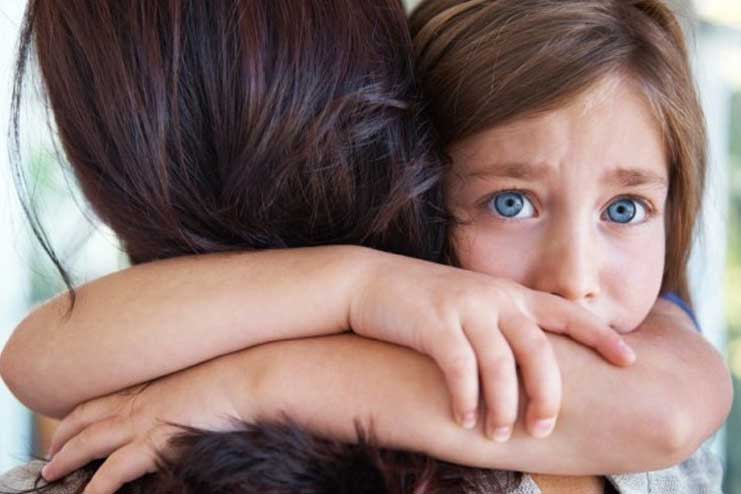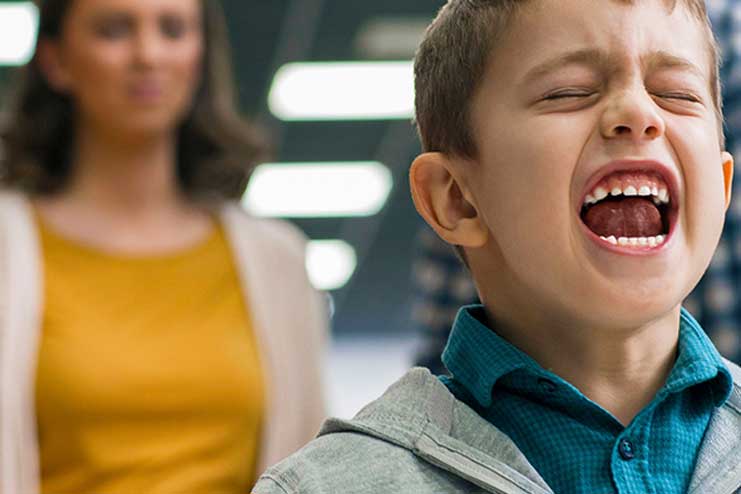In any friendly and healthy couple relationships, it is common to come across small fights and occasional disagreements. Though it is very common for the parents to argue, it may affect the emotions of the witnessed child. Learn about what you can do to limit the harm to your kids.
Your child’s mental development not only depends on the relationship between you and your kid but also how parents get on with each other plays a prominent role.
This article discusses the long term effects of parents fighting on child development. It presents ways to stop fighting in front of the kids.
Why Parents Fighting Is a Problem:

Kids are very sensitive to the conflicts that arise between their parents.
High-level conflicts may have adverse effects on your child’s mental health for the following reasons:
Emotional Insecurity:
Fighting in front of the kids may make them fear about the stability of the family. Arguments may destroy their pleasant mind and may make them worry about divorce.
Children May Feel Alone:
Parents may feel stress due to conflict and rarely spend quality time with their kids. Sometimes, kids may be frightened by your conflict which makes them spend most of the time away from you.
Effects of Parents Fighting In Front of Kids:

Parental fights may affect your kids physically, emotionally, and psychologically.
1. Physical Complaints:
The child who often witnesses the conflicts between their parents has many complaints about their physical health like headache, stomach ache, cold, skin allergies, etc. Parents fighting adversely affects child development
2. The Child May Regret To Express Their Feelings:
Children may easily pick up the bad things going on anywhere. Family situations may have a greater impact on their daily life challenges. The relationship between the parents greatly affects their confidence in the stability and safety of their families. This may throw them into the thoughts that their family is very close to destruction making to avoid expressing their insecurities verbally.
3. Aggression:
Kids on seeing their parents fighting in front of them feel that fighting and arguing is the only way to solve any problem. They will try to implement the same way to resolve their issues.
4. They Start To Cry:
Toddlers and older kids start to cry when they see their parents fighting aggressively.
5. They Behave Violently:
Children who experience conflicting climate at the home may behave cruelly and tend to hurt themselves. In order to cope up with their emotions, they exhibit rude behavior towards insects and animals.
6. They Exhibit Abnormal Behaviors:
Conflicts between the parents may make the kids argumentative, irritable, fragile, socially withdrawn, vulnerable to abuse, frequent absenteeism, crying secretly, throwing tantrums more often.
It may result in the child exhibiting psychological destructive signs like low self-esteem, feelings of loneliness, depression, anxiety, stress, sleep, and learning difficulties.
7. Failure In Future Relationships:
If you and your partner are arguing and fighting constantly, your kid may also develop the same behavior towards his/her partner in adulthood.
8. Poor Academic Performance:
Their minds are preoccupied with insecure home environments, which makes it difficult for them to concentrate on studies. Emotional stress makes kids fall sick regularly thereby making them irregular to school. Emotional stress deconstructs the ability of the immune system thus making kids more vulnerable to infections, and allergies.
[Read: How Does Marriage Changes After Baby]
Long Term Effects of Parents Fighting on Children:

Here are the long term effects on kids due to parents fighting:
1. Decreased Cognitive Performance:
Cognitive performance is the ability of a person to learn and perform. A study published by the society for research in child development (SRCD), found that stress associated with the children living in a conflicting environment may affect the child’s functioning. The kids exhibit very poor ability in solving problems and understanding the new patterns.
2. Eating Disorders:
Children living in conflicting environments exhibit severe eating disorders like anorexia and bulimia.
3. Behavior Problems:
Children of conflicting environments may exhibit social problems and find difficulty in making new friends at school. They tend to be aggressive most of the time.
4. School Drop Outs:
Living in a conflicting family increases the chances of school dropouts and low grades.
5. Children Develop a Negative Outlook:
Children living in a conflicting environment are most likely to develop a negative outlook on their family and themselves. They may blame themselves and finally, they shape their negative personality which lasts a lifetime.
6. Substance Use and Abuse:
Children living in a conflicting environment are more likely to use abusive substances. They are more vulnerable to being addicted to substances like alcohol, tobacco, and other forms of drugs.
Things to Keep in Mind while Fighting in Front of Your Kids:

1. Avoid Calling Names:
Avoid calling each other names in front of your kids which may create a negative impact on them regarding marriage and relationships.
2. Avoid Major Issues:
Avoid turning the minor issues into major ones. Try to resolve the issues at the beginning itself by having a private conversation.
3. Handle Things With Kindness And Empathy:
Express disapproval, disagreement with kindness by using polite phrases.
4. Do Not Blame In Front of Kids:
It does not blame each other for the missed deadlines. Remedy the current situation and come up with ways of doing it better next time.
5. Solve The Problems Together:
Discuss and put the ideas on the table together instead of digging on opposite sides.
6. Avoid Physical Aggression:
Avoid the forms of physical aggression like throwing things at each other, breaking or destroying things.
7. Love Each Other:
Ensure your child that you and your partner still love each other even after the fight which makes them understand that arguments are common sometimes.
8. Do Not Lose Temper:
Maintain your temper level balanced. If you lose the temper and speak out the words unconsciously then apologize for your mistake. This teaches kids that anger is not the solution to all conflicts.
9. Never Involve Your Child In The Argument:
Avoid involving your kid in the argument. If the child is made to choose either of the parents he may feel confused and start blaming themselves. It is well known that only happy parents can generate a happy generation.
10. Be Mindful of The Language:
Keep the language in mind while having a conversation in front of your kids. Never use abusive, ugly or hurting words.
Talk To Your Kids about Parents Fighting:

Kids usually hate conflicting arguments, when it involves their parents. It makes the kids feel scared. So, it is important to make the kids understand that everything has settled and explained to them the reason for the conflict. Here are the few guidelines on talking to the kids about parents fighting.
1. Explain The Reason For Conflict:
Without explaining them the adult problems, give them the age-appropriate brief description for the root cause of the conflict.
2. It Is ok For Parents To Argue Sometimes:
Make your kids understand that arguing does not mean to stop loving each other. Arguments once in a while are healthy and help people to get their negative feelings out. Just like kids, when the parents have come across a bad day, they will get upset and start arguing.
3. Talk About Your Feelings:
Tell your kids your feelings at the time of argument and explain to them why you lost the temper. Make your kids know that the feelings won’t think. It is you to think before arguing and hurting others.
4. Make Your Kids Know It Is Not Their Fault:
If the fight is about your young child, this makes your younger child feel guilty for being the reason for the conflict.
5. Apologize For The Conflict:
Say sorry if your argument upsets them, thereby they take you as a good example and it will help them to feel better.
6. Do Not Speak Authoritatively:
Authoritative speaking may make your child feel stressed. Talk with them in a loving manner that delights your kids.
7. Remind Them That Their Parents Don’t Want To Argue:
The kids may misunderstand their parents when they argue. Comfort them by telling them that their conflict is the result of frustration.
8. Be Sure To Have a Fair Fight In Front of Your Kids:
It does not engage in the conflicting fight of calling names and blaming each other. The fair fight will help the kids teach one how to voice an opinion in a positive manner. Convey your apologies will help your kids to learn the value of healthy relationships.
Tips to avoid conflict and ways To Stop Fighting In Front of Your Kids:

Here are the few tips to avoid conflict at home
1. Be a Peacekeeper:
Make yourself trained to practice peaceful techniques. Never jump into the conflicts. Do not try to encourage people with bad emotions.
2. Express Your Feelings in a Respectful Way:
The best way to speak out your mind to the opposite person is by using respectful conversation. You can achieve this by using some polite phrases that can exhibit your empathy.
3. Keep Control on Your Tongue:
Think before you spill a word. Do not unnecessarily get into argument as it may adversely affect the relationships. Try to sort out the difference using a smooth tone of voice.
4. Pick The Right Time To Discuss:
The right time will help you pick up decisions easily. Do not involve yourself in making decisions after sleepless nights or when you are in a bad mood. This may increase the chance of getting into an argument.
5. Listen To Your Partner:
It can be very distressing to realize that your partner is not listening to you at all. Be a good listener and give them a chance to express themselves. This strategy will help to avoid misunderstandings.
6. Know Your Responsibilities:
Ensure that you and your partner know each other. Sit and talk about the priorities and be supportive of each other.
If the argument is so heated and you can not stop it. Here are a few ways to postpone it for later.
7. Walk Away:
Take the decision not to fight in front of your kids. Ignore and walk away if your spouse has done anything that puts you on fire. Control your impulses in order to secure your kid’s peace of mind. Write down everything on your thinking and the way you feel when you walk away. Give it to your partner later so that you can discuss it when the kids are not around.
8. Decide a Visual Cue:
Sit together and discuss on some visual cues to avoid fighting in front of kids. These signals warn you not to start fighting as the children are around and save it for later.
Children are emotionally sensitive. Conflicting environments may make them physically and mentally disturbed. It is your responsibility to offer them a friendly and peaceful growing environment. The ways mentioned in this article to manage to fight in front of kids will help you to protect your kids from the adverse effects of the fighting.









































